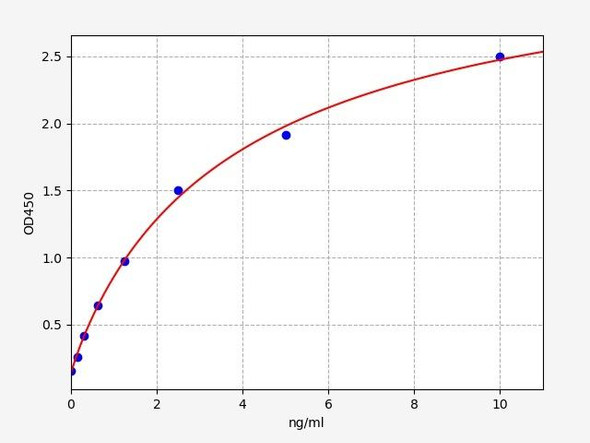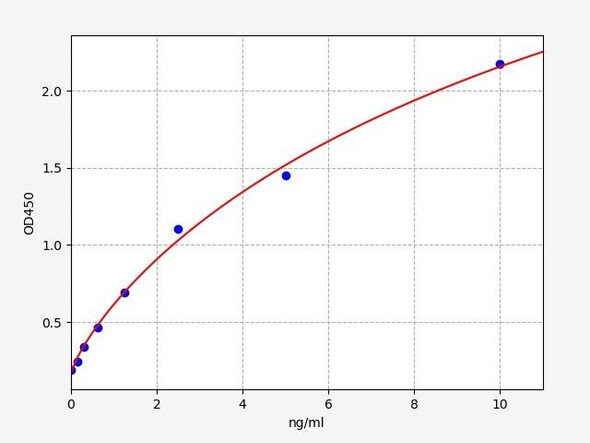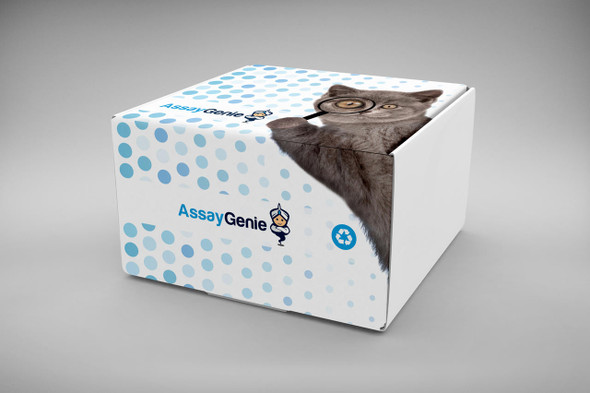Human Coronin-1A (CORO1A) ELISA Kit (HUEB0409)
- SKU:
- HUEB0409
- Product Type:
- ELISA Kit
- Size:
- 96 Assays
- Uniprot:
- P31146
- Range:
- 0.156-10 ng/mL
- ELISA Type:
- Sandwich
- Synonyms:
- Coronin-1A, CORO1A, TACO, Clipin-A, Tryptophan aspartate-containing coat protein, Coronin-like protein A, Coronin-like protein p57
- Reactivity:
- Human
Description
Human Coronin-1A (CORO1A) ELISA Kit
The Human Coronin-1A (Coro1A) ELISA Kit is designed for the precise quantification of Coronin-1A levels in human samples such as serum, plasma, and cell culture supernatants. This kit boasts exceptional sensitivity and specificity, ensuring accurate and consistent results, making it an invaluable tool for a variety of research endeavors.Coronin-1A is a key protein involved in cell movement and immune cell function, playing a critical role in various cellular processes. Dysregulation of Coronin-1A has been linked to autoimmune diseases, inflammatory disorders, and cancer, underscoring its importance as a biomarker for understanding disease pathogenesis and potential therapeutic interventions.
With the Human Coronin-1A (Coro1A) ELISA Kit, researchers can delve deeper into the mechanisms underlying Coronin-1A's functions and explore its implications in disease progression. Trust in this reliable assay to uncover crucial insights into the role of Coronin-1A and pave the way for groundbreaking discoveries in the field of biomedical research.
| Product Name: | Human Coronin-1A (CORO1A) ELISA Kit |
| SKU: | HUEB0409 |
| Size: | 96T |
| Target: | Human Coronin-1A (CORO1A) |
| Synonyms: | Coronin-like protein A, Coronin-like protein p57, Tryptophan aspartate-containing coat protein, Clipin-A, TACO, CORO1 |
| Assay Type: | Sandwich |
| Detection Method: | ELISA |
| Reactivity: | Human |
| Detection Range: | 0.156-10ng/mL |
| Sensitivity: | 0.067ng/mL |
| Intra CV: | 4.5% | ||||||||||||||||||||
| Inter CV: | 6.8% | ||||||||||||||||||||
| Linearity: |
| ||||||||||||||||||||
| Recovery: |
| ||||||||||||||||||||
| Function: | May be a crucial component of the cytoskeleton of highly motile cells, functioning both in the invagination of large pieces of plasma membrane, as well as in forming protrusions of the plasma membrane involved in cell locomotion. In mycobacteria-infected cells, its retention on the phagosomal membrane prevents fusion between phagosomes and lysosomes. |
| Uniprot: | P31146 |
| Sample Type: | Serum, plasma, tissue homogenates, cell culture supernates and other biological fluids |
| Specificity: | Natural and recombinant human Coronin-1A |
| Sub Unit: | Binds actin. |
| Research Area: | Immunology |
| Subcellular Location: | Cytoplasm Cytoskeleton Cytoplasm Cell cortex Cytoplasmic vesicle Phagosome membrane In non-infected macrophages, associated with the cortical microtubule network. In mycobacteria-infected macrophages, becomes progressively relocalized and retained around the mycobacterial phagosomes. Retention on the phagosomal membrane is strictly dependent on mycobacterial viability and not due to impaired acidification (By similarity). |
| Storage: | Please see kit components below for exact storage details |
| Note: | For research use only |
| UniProt Protein Function: | coronin 1A: May be a crucial component of the cytoskeleton of highly motile cells, functioning both in the invagination of large pieces of plasma membrane, as well as in forming protrusions of the plasma membrane involved in cell locomotion. In mycobacteria- infected cells, its retention on the phagosomal membrane prevents fusion between phagosomes and lysosomes. Belongs to the WD repeat coronin family. |
| UniProt Protein Details: | Protein type:Motility/polarity/chemotaxis; Cytoskeletal Chromosomal Location of Human Ortholog: 16p11.2 Cellular Component: actin filament; axon; cortical actin cytoskeleton; cytoplasm; early endosome; immunological synapse; intercellular junction; lamellipodium; membrane; nucleus; phagocytic cup; phagocytic vesicle; phagocytic vesicle membrane; plasma membrane; protein complex Molecular Function:actin binding; actin filament binding; actin monomer binding; cytoskeletal protein binding; myosin heavy chain binding; phosphoinositide 3-kinase binding; protein binding; protein C-terminus binding; protein homodimerization activity Biological Process: actin cytoskeleton organization and biogenesis; actin filament organization; calcium ion transport; cell motility; cell-substrate adhesion; formation of immunological synapse; homeostasis of number of cells within a tissue; innate immune response; leukocyte chemotaxis; natural killer cell degranulation; negative regulation of actin nucleation; negative regulation of neuron apoptosis; negative regulation of vesicle fusion; phagocytosis; phagolysosome formation; positive chemotaxis; positive regulation of cell migration; positive regulation of T cell proliferation; regulation of actin cytoskeleton organization and biogenesis; regulation of cell shape; regulation of release of sequestered calcium ion into cytosol; T cell homeostasis; uropod organization and biogenesis Disease: Immunodeficiency 8 |
| NCBI Summary: | This gene encodes a member of the WD repeat protein family. WD repeats are minimally conserved regions of approximately 40 amino acids typically bracketed by gly-his and trp-asp (GH-WD), which may facilitate formation of heterotrimeric or multiprotein complexes. Members of this family are involved in a variety of cellular processes, including cell cycle progression, signal transduction, apoptosis, and gene regulation. Alternative splicing results in multiple transcript variants. A related pseudogene has been defined on chromosome 16. [provided by RefSeq, Sep 2010] |
| UniProt Code: | P31146 |
| NCBI GenInfo Identifier: | 1706004 |
| NCBI Gene ID: | 11151 |
| NCBI Accession: | P31146.4 |
| UniProt Secondary Accession: | P31146,Q2YD73, B2RBL1, |
| UniProt Related Accession: | P31146 |
| Molecular Weight: | 51,026 Da |
| NCBI Full Name: | Coronin-1A |
| NCBI Synonym Full Names: | coronin 1A |
| NCBI Official Symbol: | CORO1A |
| NCBI Official Synonym Symbols: | p57; IMD8; TACO; CLABP; HCORO1; CLIPINA |
| NCBI Protein Information: | coronin-1A |
| UniProt Protein Name: | Coronin-1A |
| UniProt Synonym Protein Names: | Coronin-like protein A; Clipin-A; Coronin-like protein p57; Tryptophan aspartate-containing coat protein; TACO |
| Protein Family: | Coronin |
| UniProt Gene Name: | CORO1A |
| UniProt Entry Name: | COR1A_HUMAN |
| Component | Quantity (96 Assays) | Storage |
| ELISA Microplate (Dismountable) | 8×12 strips | -20°C |
| Lyophilized Standard | 2 | -20°C |
| Sample Diluent | 20ml | -20°C |
| Assay Diluent A | 10mL | -20°C |
| Assay Diluent B | 10mL | -20°C |
| Detection Reagent A | 120µL | -20°C |
| Detection Reagent B | 120µL | -20°C |
| Wash Buffer | 30mL | 4°C |
| Substrate | 10mL | 4°C |
| Stop Solution | 10mL | 4°C |
| Plate Sealer | 5 | - |
Other materials and equipment required:
- Microplate reader with 450 nm wavelength filter
- Multichannel Pipette, Pipette, microcentrifuge tubes and disposable pipette tips
- Incubator
- Deionized or distilled water
- Absorbent paper
- Buffer resevoir
*Note: The below protocol is a sample protocol. Protocols are specific to each batch/lot. For the correct instructions please follow the protocol included in your kit.
Allow all reagents to reach room temperature (Please do not dissolve the reagents at 37°C directly). All the reagents should be mixed thoroughly by gently swirling before pipetting. Avoid foaming. Keep appropriate numbers of strips for 1 experiment and remove extra strips from microtiter plate. Removed strips should be resealed and stored at -20°C until the kits expiry date. Prepare all reagents, working standards and samples as directed in the previous sections. Please predict the concentration before assaying. If values for these are not within the range of the standard curve, users must determine the optimal sample dilutions for their experiments. We recommend running all samples in duplicate.
| Step | |
| 1. | Add Sample: Add 100µL of Standard, Blank, or Sample per well. The blank well is added with Sample diluent. Solutions are added to the bottom of micro ELISA plate well, avoid inside wall touching and foaming as possible. Mix it gently. Cover the plate with sealer we provided. Incubate for 120 minutes at 37°C. |
| 2. | Remove the liquid from each well, don't wash. Add 100µL of Detection Reagent A working solution to each well. Cover with the Plate sealer. Gently tap the plate to ensure thorough mixing. Incubate for 1 hour at 37°C. Note: if Detection Reagent A appears cloudy warm to room temperature until solution is uniform. |
| 3. | Aspirate each well and wash, repeating the process three times. Wash by filling each well with Wash Buffer (approximately 400µL) (a squirt bottle, multi-channel pipette,manifold dispenser or automated washer are needed). Complete removal of liquid at each step is essential. After the last wash, completely remove remaining Wash Buffer by aspirating or decanting. Invert the plate and pat it against thick clean absorbent paper. |
| 4. | Add 100µL of Detection Reagent B working solution to each well. Cover with the Plate sealer. Incubate for 60 minutes at 37°C. |
| 5. | Repeat the wash process for five times as conducted in step 3. |
| 6. | Add 90µL of Substrate Solution to each well. Cover with a new Plate sealer and incubate for 10-20 minutes at 37°C. Protect the plate from light. The reaction time can be shortened or extended according to the actual color change, but this should not exceed more than 30 minutes. When apparent gradient appears in standard wells, user should terminatethe reaction. |
| 7. | Add 50µL of Stop Solution to each well. If color change does not appear uniform, gently tap the plate to ensure thorough mixing. |
| 8. | Determine the optical density (OD value) of each well at once, using a micro-plate reader set to 450 nm. User should open the micro-plate reader in advance, preheat the instrument, and set the testing parameters. |
| 9. | After experiment, store all reagents according to the specified storage temperature respectively until their expiry. |
When carrying out an ELISA assay it is important to prepare your samples in order to achieve the best possible results. Below we have a list of procedures for the preparation of samples for different sample types.
| Sample Type | Protocol |
| Serum | If using serum separator tubes, allow samples to clot for 30 minutes at room temperature. Centrifuge for 10 minutes at 1,000x g. Collect the serum fraction and assay promptly or aliquot and store the samples at -80°C. Avoid multiple freeze-thaw cycles. If serum separator tubes are not being used, allow samples to clot overnight at 2-8°C. Centrifuge for 10 minutes at 1,000x g. Remove serum and assay promptly or aliquot and store the samples at -80°C. Avoid multiple freeze-thaw cycles. |
| Plasma | Collect plasma using EDTA or heparin as an anticoagulant. Centrifuge samples at 4°C for 15 mins at 1000 × g within 30 mins of collection. Collect the plasma fraction and assay promptly or aliquot and store the samples at -80°C. Avoid multiple freeze-thaw cycles. Note: Over haemolysed samples are not suitable for use with this kit. |
| Urine & Cerebrospinal Fluid | Collect the urine (mid-stream) in a sterile container, centrifuge for 20 mins at 2000-3000 rpm. Remove supernatant and assay immediately. If any precipitation is detected, repeat the centrifugation step. A similar protocol can be used for cerebrospinal fluid. |
| Cell culture supernatant | Collect the cell culture media by pipette, followed by centrifugation at 4°C for 20 mins at 1500 rpm. Collect the clear supernatant and assay immediately. |
| Cell lysates | Solubilize cells in lysis buffer and allow to sit on ice for 30 minutes. Centrifuge tubes at 14,000 x g for 5 minutes to remove insoluble material. Aliquot the supernatant into a new tube and discard the remaining whole cell extract. Quantify total protein concentration using a total protein assay. Assay immediately or aliquot and store at ≤ -20 °C. |
| Tissue homogenates | The preparation of tissue homogenates will vary depending upon tissue type. Rinse tissue with 1X PBS to remove excess blood & homogenize in 20ml of 1X PBS (including protease inhibitors) and store overnight at ≤ -20°C. Two freeze-thaw cycles are required to break the cell membranes. To further disrupt the cell membranes you can sonicate the samples. Centrifuge homogenates for 5 mins at 5000xg. Remove the supernatant and assay immediately or aliquot and store at -20°C or -80°C. |
| Tissue lysates | Rinse tissue with PBS, cut into 1-2 mm pieces, and homogenize with a tissue homogenizer in PBS. Add an equal volume of RIPA buffer containing protease inhibitors and lyse tissues at room temperature for 30 minutes with gentle agitation. Centrifuge to remove debris. Quantify total protein concentration using a total protein assay. Assay immediately or aliquot and store at ≤ -20 °C. |
| Breast Milk | Collect milk samples and centrifuge at 10,000 x g for 60 min at 4°C. Aliquot the supernatant and assay. For long term use, store samples at -80°C. Minimize freeze/thaw cycles. |









